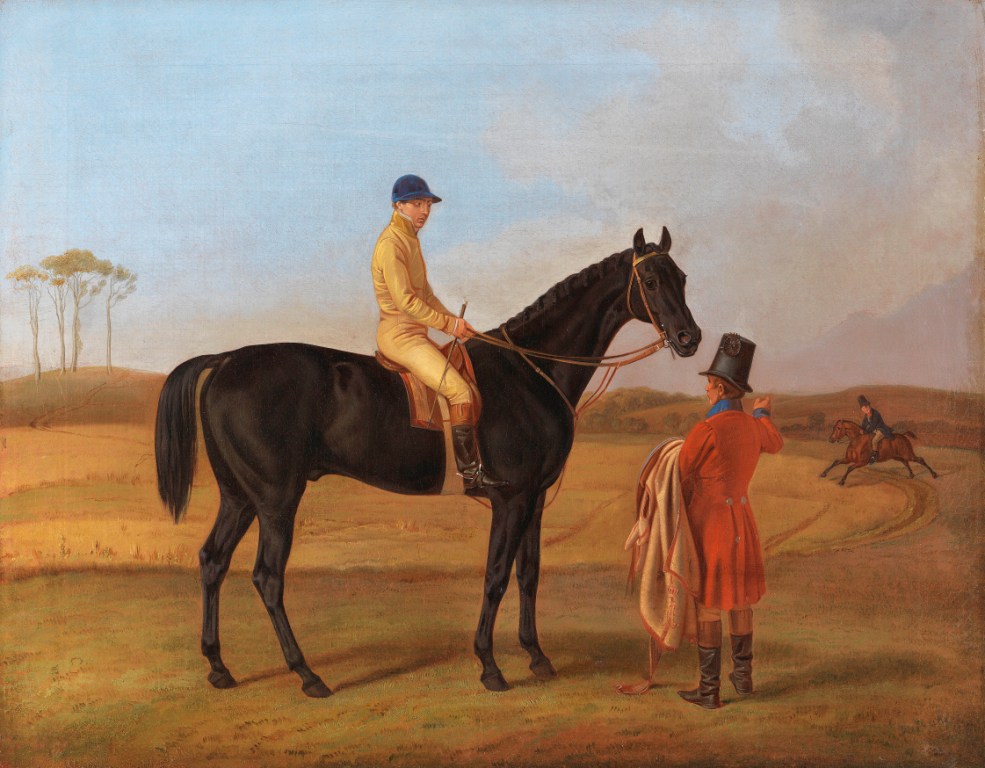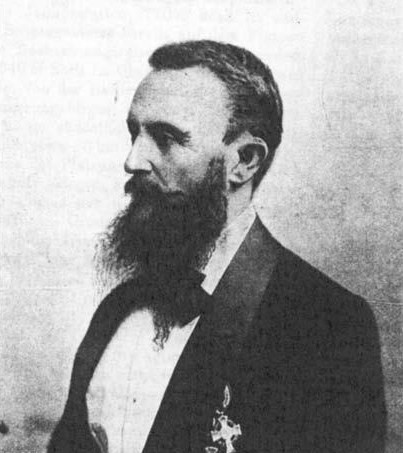

Personalities from the Past
Most enquiries to the NLHS web site are about fairly benign local, equestrian or family history.
But just occasionally they open up a line of further enquiry that leads to the exposure of something totally unexpected and in this case a hidden royal family secret.
Thanks to painstaking research by member David Rippington we have a very comprehensive story of Richard Parkinson and some family members. Too much for the purposes of this article but the complete story can be made available by applying to webmaster@newmarketlhs.org.uk.
Life in Denmark
To give him his full title, the Duke was Christian August II, Duke of
Schleswig-Holstein-Sonderburg-Augustenburg, and was a close successor to the Danish throne. In the Danish royal family tree, the Duke's sister was the second wife of King Christian VIII and his mother was the sister of King Frederick VI. The Duke played a key role in the early 19th century Danish racing industry and his stud produced many famous racehorses.
Richard's equestrian skills seems to have impressed the racing
industry at that
time; as he even gets a mention in a book about horsebreeding on Als, as shown
here (in German):- Then came the event that brought about the downfall of Richard's racing career. The Duke had an illicit affair with the lady-in-waiting to his wife, the Duchess. The girl was Louise Sophie Caroline Bruning, daughter of a local shoemaker. When Louise became pregnant by him, rather than admitting responsibility for the illegitimate child, the Duke apparently forced Richard to marry Louise on 9th October 1844, presumably to legitimise the baby (Louise would have been about 8 months pregnant at the time).
Taking his marital father's surname the child was Richard Heinrich Robert Parkinson and he was born in Augustenborg on 13th November 1844.
His story, including his birth origins are shown in his own biography - Dreizig Jahre in der Sudsee - (Thirty years in the South Seas) -
https://books.google.co.uk/books?id=ur_NrKoJ_r4C&pg=PR15&lpg=PR15&dq=Louise+sophie+caroline Richard's legacy in Papua New Guinea is still very well-known and a descendant of his, Max Uechtritz, has compiled his own version of events for Richard's life -
http://asopa.typepad.com/asopa_people/2011/02/the-parkinson-legacy-lives-on.html Louise Sophie Caroline Parkinson We have to thank our initial enquirer
Poul Krog for the following details. His access to the Augustenborg archives has
uncovered some of Louise's subsequent life. Jockey Richard Parkinson's family life
So what happened to Richard Parkinson senior - our vanishing jockey? ... There are no further records for him in Denmark and
although he seems to have immediately returned to England, he doesn't appear on any of the early censuses. Robert was born in Stamford, Lincolnshire in 1775
and Harriet in Attleborough, Norfolk in 1780. They were married at St Mary's, Newmarket on 13th October 1800. Robert Parkinson the Stone Mason On the 1841 census the family were at Boundary House, Exning. From 1844 until 1871 there are no records for jockey Richard
Parkinson and his life is somewhat of a mystery during this time. 'Licensed Lodging House' doesn't seem to be the most salubrious
living quarters and the depths that Richard had sunk to become even more obvious
in a workhouse record for 1879 and then on the 1881 census:- Richard's life then took another strange twist, when in 1890 his brother Charles died. Charles was born in Newmarket on 10th January 1813. He left Newmarket and enlisted in the Royal Navy on 23rd October 1841, progressing through the rank of Ship's Master to become a Navigating Lieutenant. As was shown by all the early records for the Parkinson family they clearly were endemic to Newmarket - so it's no surprise that following the windfall from his brother that Richard returned to Newmarket and is shown as a lodger at the Bushel on the 1891 census:- [Note that the Bushel was directly opposite the Woolpack, where his brother
Robert was landlord in the 1850s.] Sad though this story may seem - Richard Parkinson lived a fairly tumultuous and at times
highly eventful life - moved in royal circles - and eventually lived to the ripe-old-age of 89 ... not bad for a humble Newmarket-born 19th century jockey.
The enquirer, Danish historian Poul Krog, had been aware of the fairly successful equestrian career for a jockey called Richard Parkinson that had occurred in the middle of the 19th century in Denmark. Poul
also knew that Richard had originated from Newmarket; hence the reason for contacting the NLHS. Richard's equestrian career though had been brought to a very abrupt end - the reasons for this and what had subsequently happened to him
seems to have been somewhat
shrouded in mystery.

Richard Parkinson and Egremont at the
Augustenborg Racecourse - 1837
Reproduced with kind permission of Ketterer Kunst, Munich
(further details can be found in the book 'A History of the English Turf - by Theodore Andrea Cook, M.A, F.S.A' - page 418 - https://archive.org/stream/historyofenglish02cookrich#page/418/mode/2up
"Die Veredlung der Pferdezucht auf Alsen. In einer Reihe von Bildnissen und skizzen" - "The Refining of Horse Breeding on Als. In a series of
portraits and sketches"
There's a section about the 4yo black stallion Egremont's breeding and racing form with Richard as jockey, and then the following attribution:-
der Herzogliche Jockey Richard Parkinson - the Ducal Jockey Richard Parkinson. The book was published in 1839.
Though the exact details arent known, the Duke then encouraged Richard to move on, leaving Louise to care for the child on her own. Eventually though the Duke did take an interest in his offspring and he later attended school in Augustenborg Castle.

(Parkinson junior) Richard Heinrich Robert Parkinson
Young Richard went on to greater things - clearly encouraged by his birth father. He's best known for being a famous Danish explorer and anthropologist -
https://en.wikipedia.org/wiki/Richard_Parkinson_(explorer)
Presumably she lived at Augustenborg Castle during her time there as a seamstress. However, during the pregnancy, she moved home to her parents.
She and young Richard later moved to a large house in Storegade (the main street in Augustenborg), where she continued her trade sewing for the ladies in
Augustenborg and the ladies-of-the-court at the castle. Louise received a yearly income from the Duchess, even after the Duke family's escaped from Denmark in 1848 - which presumably explains how Louise, as a seamstress, could afford to live in such a large house. This is probably further confirmation that the Duke was indeed the father of young Richard.
It's at this point that to understand Richard's later life you have to find out more about who Richard Parkinson actually
was - so let's start at the beginning.
Name: Richard Parkinson
Gender: Male
Baptism Date: 18 Jun 1815
Baptism Place: Newmarket, Saint Mary's, Suffolk, England
Father: Robert Parkinson
Mother: Harriot
FHL Film Number: 952197, 952198
By 1851 his father, mother and brother Edward were living in Paradise Row, All Saints Road.
Richard's siblings were Edward (like Richard born in Kennett, Robert who became a stonemason and publican (Grosvenor Arms and later, the Woolpack), John, Charles, William and Thomas .
Between 1844 and 1871 records for jockey Richard Parkinson have not been found, he next appears in the 1871 census at lodgings in St Mary le Strand, London. It does not appear to be the most salubrious establishment, but probably superior to his next location which was the Workhouse in 1879 and the 1881 census.
Then in 1871 he appears on the census for that year:-
Lodger
Licensed Lodging House
St Mary Le Strand, London
b. abt. 1818, Newmarket
Supposition has it that Richard ought to have received a handsome pay-off for his role in marrying Louise, especially as he subsequently lost his livelihood
as trainer. Certainly at this time the marriage would have been legitimate and binding, ensuring that Richard would have also been forfeiting any possibility of ever marrying again whilst Louise was alive. This does not appear to have been the case, hence Richard sinking to the depths of living in a
workhouse.
Birth Date: abt 1815
Admission Age: 64
Admission Date: 1879
Discharge Date: 27 Dec 1879
Record Type: Admission and Discharge
Borough: Holborn
Parish or Poor Law Union: Holborn
Place: London, England
Title: Broad Street Workhouse Register, 1879
Pauper
The Strand Union Workhouse
He served in the navy during the Crimean War (October 1853, March 1856) and was awarded both 6th Class and eventually 5th Class of the Order of the Medjidie.
Charles retired from active military service on 19th March 1855, though he seems to have continued as a
Ship's Master around the UK for some years after, until at least 1867. On full retirement he was awarded a navy pension of £50 a year [worth about £55,000 a year in 2016].
He died on 30th May 1890 and as is shown on his probate he was living at No.76 East Street, Manchester Square, Marylebone
[East Street is now Chiltern Street, W1] - a very smart mews house in the centre of London.
The key detail here is that Charles left his estate to our Richard, who is shown as having been living with him at that time.
Lodger
The Bushel, Drapery Row, Newmarket
b. 1815 Kennett, Cambridgeshire
This census is the key record that confirms that this was indeed
Newmarketonian Richard; as it lists his birth place as actually being in Kennett, Cambridgeshire -
Richard's brother Edward was also born in Kennett, so the family must have lived there around
that time
(1815 / 1817).
Edward's 79yo widowed wife Alpha Parkinson was the only other family member still alive in Newmarket by that time (no longer in Paradise Row; as that had
been pulled down and the present All Saints Terrace had been built in its place. ( No.16-32 All Saints Road). She was now living in No.7 Alms House at the Rous
Memorial Hospital.
Alpha died in 1893 and was buried in All Saints on 12th January. Richard was now totally alone and although he's presently not been found on the 1901 census his death record shows
that he died in Newmarket in 1905. The burial register give the place of death as the Union House, but does not identify the actual grave plot. His brother Edward and sister in law Alpha are interred in Old Ground M:1335):-